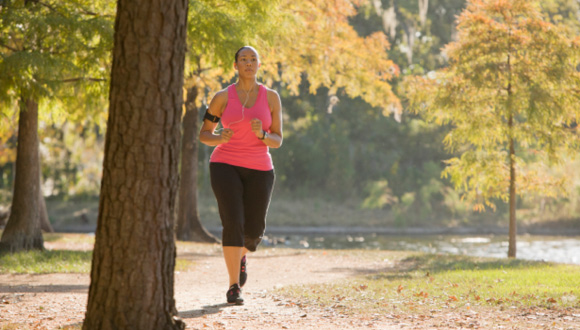Keeping up with a marathon training plan is tough — and traveling makes it even harder. Traveling can make it more difficult to find time to fit in a workout, as well as a place to do it. It can also limit your food choices, making fueling up for your runs more challenging.
Kristin Salinas, athletic trainer at Houston Methodist and experienced marathon runner, recommends the following tips when it comes to keeping up with your marathon training while traveling.
Adjust your training schedule
One of the most important parts of training for a marathon is keeping up with your weekly mileage goals. While something like an illness can throw off your training plan, traveling doesn't have to.
"The last thing you want to do is skip out on miles," explains Salinas. "If you're missing runs, then you're not achieving your weekly mileage — and you're putting yourself at risk for injury. If you have to deviate from your training plan, skip your cross-training days before missing out on a run."
(Related: The 6 Most Common Running Injuries & How to Prevent Them)
Salinas recommends keeping tabs on your travel schedule and proactively adjusting your training to make sure you're getting in your miles.
"The best way to prevent travel from affecting your training is to plan ahead," says Salinas. "If your long mid-week run falls on a day you're traveling, move it to the weekend instead of skipping it altogether."
If you're traveling for an entire week, you may need to get creative about when and how you fit in a long run — but don't brush it off.
Plan your training sessions
If your traveling takes you to a city you've never been to, and you know you'll need to get a run or two in while you're there, it helps to do your research before you go. Salinas recommends mapping out your route ahead of time, since it helps ensure your run goes as smoothly as possible.
"If you go somewhere with no training plan, you may never get it done or you may finish it disappointed," says Salinas. "You might start your run, only to realize that the area is unsafe or lacks sidewalks. There's also the chance you could get lost or run too few miles (or too many) since you don't know where you're going."
To plan your runs, Salinas recommends using online tools and apps, or even calling the hotel ahead of time to ask about the area. Or, see if the hotel has a treadmill available.
"When I'm visiting a new city, I go online and create my running route on RunKeeper's website," says Salinas. "Not only does it help track my mileage, but it also has recommended routes for popular cities, like Austin or San Francisco."
If your travel plans overlap with your cross-training days, Salinas recommends picking a hotel with a gym that gives you access to some light weights.
(Related: 10 Tips for Running Safely in the Dark)
Double-check your luggage
We all know how easy it is to forget to pack travel items — but don't let it happen with your training gear. Check (and double-check) that you have everything you need before you leave for your trip.
"It might sound silly, but make a checklist if you need to," says Salinas. "Do you have your running shoes? Your running socks? The gear you use to hold your keys and smartphone? Do you need to adjust your running attire to accommodate the weather?"
(Related: 3 Missteps to Avoid When It Comes to Your Running Shoes)
And that last questions is important, especially if you're going somewhere that may be cold.
"In Houston, we sometimes forget to think about running in cold temperatures," says Salinas. "Everyone's different, but if it's going to be cold where you're going, pack layers. It's better to have to take items off as you warm up than to not be warm at all."
Heat can easily escape from your head and your hands, so Salinas recommends a beanie and gloves for added warmth. She also warns against overdoing it on your socks.
"If you're going somewhere cold, just wear the socks you normally wear. Don't try to layer them," says Salinas. "Focus on keeping your head, body and hands warm, and taking those items off as needed."
Aim for a well-balanced diet
We know it's hard to maintain a healthy diet while traveling — but what you eat can definitely affect a training run.
"While traveling, you may be tempted to snack or drink more, but too much binge-eating and splurging can affect your stomach," explains Salinas. "And this can impact your runs — especially long ones — since it may be the difference between completing your run and wrapping up early to use the bathroom."
It's important to know what foods affect you — and avoid them if you can. For instance, if you know spicy foods or dairy give you trouble, avoid them if you have a run later that day (or even the next day). And, don't forget, carbohydrates are your fuel and protein is important for muscle recovery. (Related: Nutrition for Endurance Runners: 5 Mistakes That Can Derail Your Training Plan)
"If you're traveling for the holidays and want to indulge a little, enjoy it!" Salinas says. "Those extra calories aren't going to be harmful to your overall training performance, unless you start to do it every day, or more days than not."








